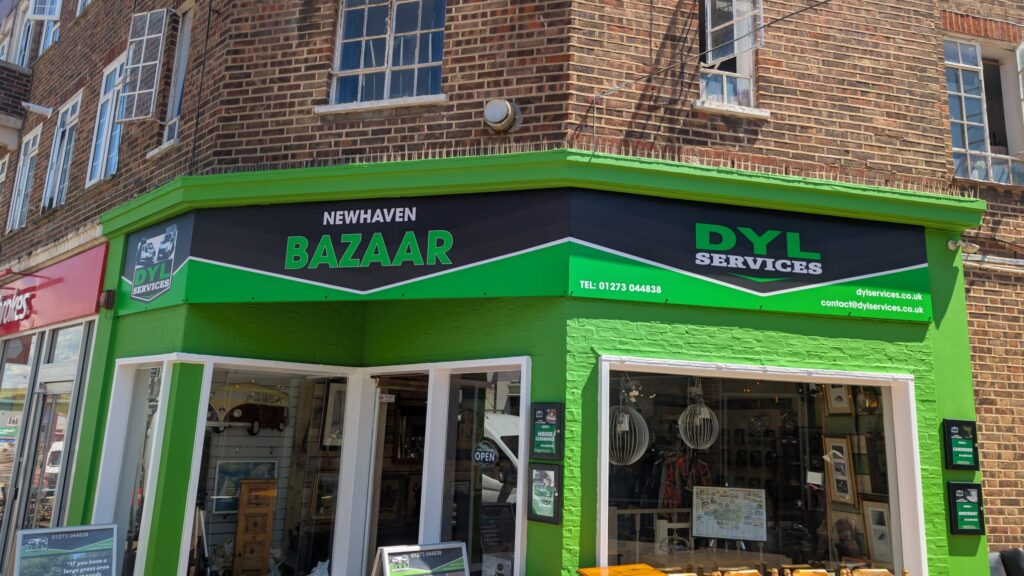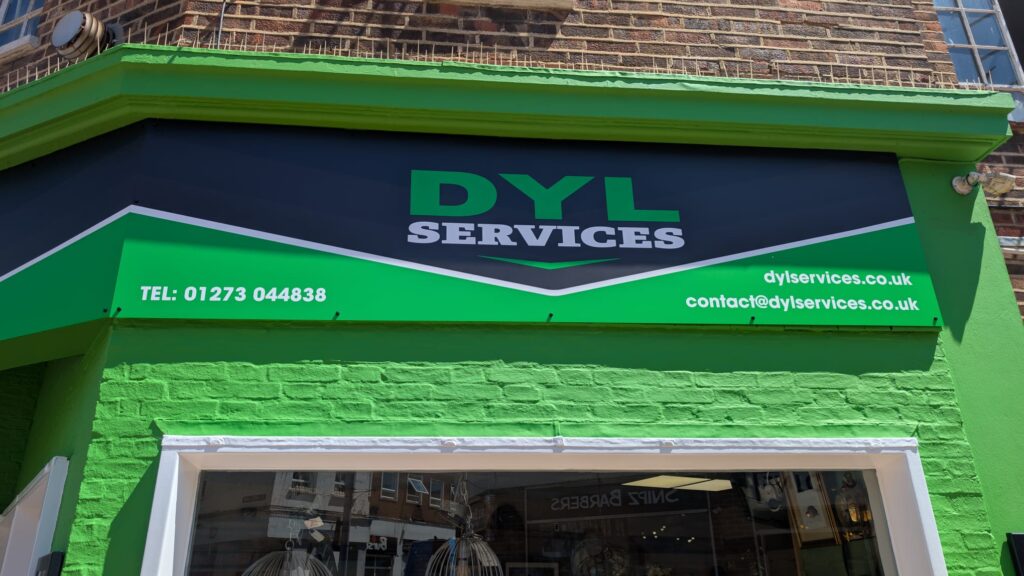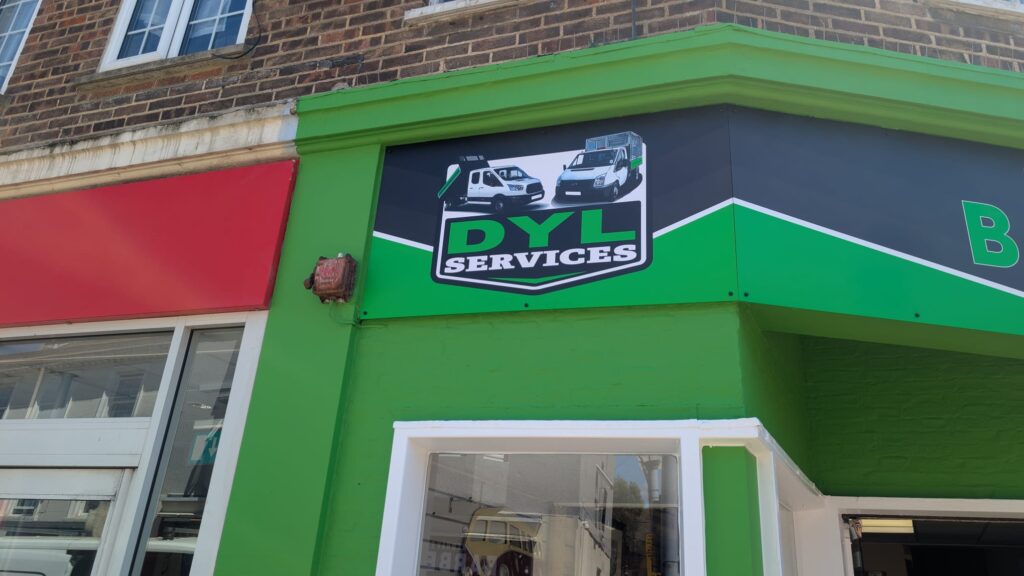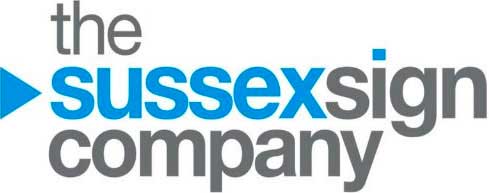When you’re investing in signage for your business, you want it to look great, last long, and represent your brand professionally. That’s why aluminium composite material (ACM) is such a popular choice in the signage world. But while ACM has a long list of benefits, it’s not a one-size-fits-all solution, so today’s question is “Should I use aluminium composite for my sign?”
In this review, we’ll cover the top 5 reasons to choose Aluminium Composite Material (ACM), and the 5 drawbacks you need to be aware of before placing your order. Whether you’re a business owner, facilities manager, or a design agency looking for the best options for your clients, this guide will help you make an informed decision.

What Is Aluminium Composite Material (ACM)?
Before we get into the pros and cons, it’s worth quickly defining what we’re talking about. ACM is made by bonding two thin sheets of aluminium to a polyethylene core. The result is a lightweight, rigid panel that’s easy to fabricate and ideal for both internal and external signage.
You might hear it referred to by brand names like Dibond®, Alupanel®, or Reynobond®, but they’re all variations of the same concept.
Should I use aluminium composite for my sign? 5 Reasons as to why you should:
- Should I use aluminium composite for my sign? Yes it’s Lightweight Yet Rigid
One of ACM’s biggest advantages is how lightweight it is, especially when compared to solid metal alternatives. This means:
- Easier and cheaper transportation
- Quicker installation (no need for reinforced fixings in most cases)
- Lower structural stress on walls, poles, or fascia boards
And despite being lightweight, ACM is incredibly rigid. It doesn’t warp or sag like foam boards or fluted plastic panels (like Correx), making it a reliable long-term solution for flat signage.
- Should I use aluminium composite for my sign? Yes it has an Excellent Surface for Print and Vinyl
ACM’s smooth surface is ideal for:
- UV direct printing for bold, vibrant graphics
- Self-adhesive vinyl application for intricate branding or messaging
- Laminating for extra protection in high-traffic areas
Because of this, it’s used across retail signage, business parks, directional signs, estate agent boards, and shop fascias.
The result? A clean, professional finish that enhances your brand.

- Should I use aluminium composite for my sign? Yes it’s Suitable for Indoor and Outdoor Use
Versatility is a major win here. ACM panels can be used in:
- External shop signage
- Internal directional boards
- Hoarding panels
- Exhibition displays
- Wayfinding signage
Its UV and weather resistance makes it suitable for prolonged outdoor exposure, while its neat appearance suits even high-end interior fit-outs.
You’re not locked into one type of use, which makes it an economical choice if you’re ordering multiple signs for different environments.
- Should I use aluminium composite for my sign? Yes it’s More Affordable Than Solid Aluminium
Solid aluminium is expensive. ACM gives you the same look at a fraction of the cost.
For businesses with tight budgets or large signage requirements, ACM delivers excellent value for money, without compromising on quality or appearance.
You’ll also save on fixings and structural support, since the lighter weight makes it easier to mount securely.
- Should I use aluminium composite for my sign? Yes it’s Weather and Rust Resistant
ACM doesn’t rust or rot, and it holds up well to wind, rain, and sunlight—especially when it’s made with high-quality coatings and installed by professionals.
This makes it a reliable option for:
- Coastal environments
- Car parks
- Retail parks and industrial estates
- Public buildings
With basic care, your sign will still look great several years down the line.

Should I use aluminium composite for my sign, 5 Things to Watch Out For When Choosing ACM
Now, let’s talk about the flip side. ACM isn’t perfect for every job, and it’s not all created equal. Here are 5 potential issues you should be aware of before choosing it for your next sign.
- Should I use aluminium composite for my sign? No it’s Not as Durable as Solid Aluminium
ACM is strong, but it’s still a composite, meaning it won’t match the lifespan or impact resistance of solid metal panels.
If your signage is going in a very harsh environment (e.g., constant exposure to salt spray, heavy vehicle impact zones, or long-term use above 5 years), solid aluminium might be a better choice.
Think of ACM as a durable mid-range solution, rather than an indestructible one.
- Should I use aluminium composite for my sign? There are Environmental Impact and Recycling Limitations
Although aluminium itself is recyclable, ACM’s polyethylene core makes it more difficult to recycle in standard UK waste streams.
Some specialised companies can separate and recycle ACM, but in general, it’s not considered an environmentally friendly material compared to solid aluminium or sustainably sourced timber.
If sustainability is part of your brand’s values or CSR commitments, you may want to explore alternative materials, or make sure your signage partner offers a take-back and recycling programme.
- Should I use aluminium composite for my sign? There are Varying Grades and Thicknesses
Not all ACM panels are created equal. Some cheaper variants on the market have:
- Thinner aluminium skins (e.g., 0.12mm vs. 0.3mm)
- Lower-quality cores
- Inferior coating systems that fade faster in sunlight
The key takeaway? If a quote seems too good to be true, it probably is.
At The Sussex Sign Company, we only use premium ACM from trusted suppliers like Amari Plastics to ensure you get the lifespan and finish you’re paying for.
- Should I use aluminium composite for my sign? There can be Vinyl Adhesion Issues with Low-Quality Panels
Cheaper ACM can cause problems when applying vinyl graphics, particularly with:
- Poor surface adhesion (leading to peeling)
- Inconsistent coating textures
- Reduced outdoor lifespan of the vinyl
To prevent this, we always test vinyl adhesion on new batches and use compatible laminate systems when required. But it’s worth knowing: if you go for bargain-basement ACM, you might end up paying more in the long run for reprints and replacements.
- Should I use aluminium composite for my sign? As long as the Customer understands it’s not “Aluminium”
Many people hear “aluminium composite” and assume they’re getting solid metal. But ACM is essentially a sandwich panel with a plastic centre.
So it’s important, especially for trade clients and designers, to be transparent with end customers about what they’re getting.
At The Sussex Sign Company, we always explain the difference and recommend the best material for the job, not just the cheapest.
When Should You Use ACM & When Shouldn’t You?
Ideal Use Cases for ACM:
- Retail shop signs and fascia boards
- Internal office and reception signage
- Directional and wayfinding signs
- Hoarding and construction boards
- Branded panels for exhibitions and events
- Cost-effective temporary signage
Consider Alternatives If / When:
- You need a sign to last over 5 years in extreme outdoor conditions
- Sustainability and recyclability are key priorities
- You’re creating 3D or sculptural signage that needs more structural integrity
- You require engraving or laser etching—solid metals or acrylics perform better
What to Look for in an ACM Sign Supplier
If you’re thinking about using ACM for your next signage project, make sure you work with a supplier who:
- Explains the differences between ACM grades
- Offers honest advice on material choice
- Has experience in both fabrication and vinyl application
- Works with high-quality, branded materials
- Provides a clear warranty or performance guarantee
At The Sussex Sign Company, we’ve been producing ACM signage for over 30 years, and we’ve seen all the shortcuts, mistakes, and mishaps that can happen when corners are cut.
We’ll never sell you the wrong material just to win a job.
Final Thoughts: Is ACM Right for You?
If you’re looking for a signage solution that’s:
- Lightweight
- Professional in appearance
- Affordable
- Weather-resistant
- Easy to mount and maintain
…then aluminium composite is a solid choice.
Just make sure you go in with your eyes open. Not all ACM is equal, and it’s worth paying a little more for better longevity, finish, and peace of mind.
If you’re unsure, give our team a call, we’ll help you decide if ACM is the right fit, or if another material will serve you better in the long run.
Need help with a signage project?
Contact Us: by email or telephone 01273 424900
We offer honest advice, fast turnarounds, and over 30 years of experience helping businesses across Sussex stand out.
